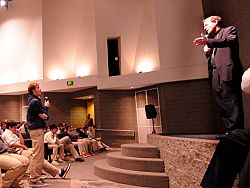Bishop Wester discusses immigration issues with Juan Diego Catholic High School students

DRAPER — Immigration issues aren’t new – in the 16th century the people indigenous to present-day Mexico suffered an influx of foreigners who completely altered the fabric of their country. Saint Juan Diego, an indigenous Mexican, experienced theses changes, so "I think it’s very fitting on his feast day to talk about this very important question of immigration," the Most Rev. John C. Wester, bishop of Salt Lake City, told students from Juan Diego Catholic High School and Saint John the Baptist Middle School at an assembly Dec. 9.
Americans hold many different viewpoints on immigration, the bishop said, but "what I’d like to challenge us to do is to think about this question of immigration analytically and not to just accept what we hear."
That applied even to what he told the students, he said. If he were speaking about faith or morals, "that would be different, but I’m speaking about a social justice issue about which the Catholic Church has very strong opinions because it affects human beings. It’s not just a political question. It’s a human question. It’s a moral question. And it’s a question that people of faith" feel they must weigh in on, and he urged the students to research it so they could listen with a critical ear.
Viewpoints on immigration differ because of people’s experiences, he said, using the analogy of how someone would perceive a person sitting in a street: A police officer might think the person was a lawbreaker, a priest might wonder if the person needed help and an elderly person might worry it was a mugger. The Catholic Church’s position on immigration "is reaching out to immigrants because they are our brothers and sisters," Bishop Wester said. "The Church doesn’t just make up these positions … but rather the Church comes at these conclusions based upon foundational concepts and principles and tenets" such as Holy Scripture, papal teachings and bishops’ actions.
"The idea is that Church teaching is something that … is the larger view, that we have inalienable rights that we have as human beings that God has given to us and that no country or border or system or organization can take away," he said.
During the assembly, students asked questions that touched on many of the key points of the immigration debate. For example, one student asked why job quotas for immigrants exist when many American citizens can’t find jobs.
"The reality is that we have the jobs for our people and for immigrants," Bishop Wester answered, pointing out that many Americans don’t want jobs in the agricultural or service industries where many immigrants work.
In answer to another question, the bishop said that undocumented persons contribute about $5 billion a year to Social Security.
The bishop’s presentation clarified some points on the issue for Juan Diego senior Nathan Tack, a student body officer. "I think I had probably some skewed viewpoints on what immigration reform is and what the DREAM Act was" but "now I see it better and I’ve changed my stance on it," he said. "I’m more open to the DREAM Act."
For Natsumi Alvarez, a Juan Diego senior who is a legal immigrant in the United States, the bishop’s presentation helped educate her peers. "The DREAM Act came up in conversation in our AP government class the other day and nobody knew what it was other than myself," she said. "It was really great to have him here just to tell us about it, to raise awareness, to let us know what we can do. I know that we can make a difference as a whole. We can make a difference as an individual but as a whole, as a community, united, and trying to increase respect and compassion for other human beings – I think it’s great to have him here so we can do that."
© Copyright 2024 The Diocese of Salt Lake City. All rights reserved.

Stay Connected With Us